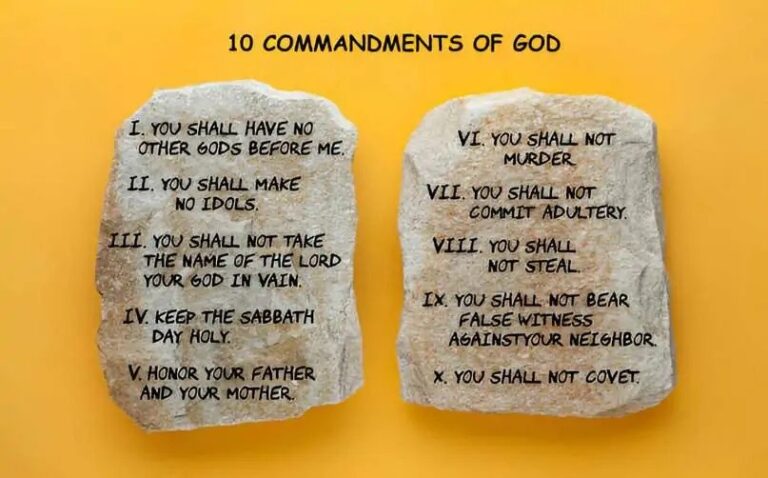The 10 Commandments stand as a pillar of faith for Christians and Jews alike. They are not just ancient rules, but a divine roadmap designed to help us live lives that are pleasing to God and beneficial to ourselves and our communities.
Let’s explore each Commandment, its meaning, and its relevance to our modern lives.
A Brief History
The 10 Commandments were given by God to Moses on Mount Sinai, as recorded in the Bible’s book of Exodus. Engraved on two stone tablets, they served as the foundation for the Law of Moses, governing the Israelites’ relationship with God and each other.
These commandments aren’t exclusive to the Jewish faith; Christians also hold them in high regard as core principles for living a righteous life. So what are the 10 commandments in the bible?
The 10 Commandments in Order
1. You shall have no other gods before me. (Exodus 20:3)
Meaning: This is a call for complete devotion to God. It means recognizing Him as the one true God and not placing anything or anyone above Him in our lives.
Scripture: “Love the Lord your God with all your heart and with all your soul and with all your strength.” (Deuteronomy 6:5)
2. You shall not make for yourself an idol. (Exodus 20:4-6)
Meaning: This prohibits the worship of any image or representation of God or other false gods. It’s about focusing our worship on the true, unseen God.
Scripture: “I am the Lord your God, who brought you out of Egypt, out of the land of slavery. You shall have no other gods before me.” (Exodus 20:2-3)
3. You shall not misuse the name of the Lord your God. (Exodus 20:7)
Meaning: We are to respect God’s name and not use it lightly, disrespectfully, or in vain.
Scripture: “You shall not take the name of the Lord your God in vain, for the Lord will not hold him guiltless who takes his name in vain.” (Exodus 20:7)
4. Remember the Sabbath day by keeping it holy. (Exodus 20:8-11)
Meaning: Set aside a day of rest (traditionally the Sabbath) for worship, reflection, and rejuvenation.
Scripture: “Six days you shall labor and do all your work, but the seventh day is a Sabbath to the Lord your God. On it you shall not do any work…” (Exodus 20:9-10)
5. Honor your father and mother. (Exodus 20:12)
Meaning: Respect and care for your parents. This commandment acknowledges the vital role parents play in our lives.
Scripture: “Children, obey your parents in the Lord, for this is right. ‘Honor your father and mother’—which is the first commandment with a promise—’that it may go well with you and that you may enjoy long life on the earth.'” (Ephesians 6:1-3)
6. You shall not murder. (Exodus 20:13)
Meaning: This commandment goes beyond the physical act of killing. It condemns violence, hatred, and any act that devalues human life.
Scripture: “You have heard that it was said to the people long ago, ‘You shall not murder, and anyone who murders will be subject to judgment.'” (Matthew 5:21)
7. You shall not commit adultery. (Exodus 20:14)
Meaning: This commandment calls for faithfulness and commitment in marriage, protecting the sacred bond between husband and wife.
Scripture: “Marriage should be honored by all, and the marriage bed kept pure, for God will judge the adulterer and all the sexually immoral.” (Hebrews 13:4)
8. You shall not steal. (Exodus 20:15)
Meaning: Respect the property of others. This includes physical theft, but also dishonesty, fraud, or taking advantage of someone.
Scripture: “Let the thief no longer steal, but rather let him labor, doing honest work with his own hands, so that he may have something to share with anyone in need.” (Ephesians 4:28)
9. You shall not give false testimony against your neighbor. (Exodus 20:16)
Meaning: Always speak the truth and avoid gossip or spreading false information about others.
Scripture: “Therefore each of you must put off falsehood and speak truthfully to your neighbor, for we are all members of one body.” (Ephesians 4:25)
10. You shall not covet. (Exodus 20:17)
Meaning: This goes deeper than wanting what others have. It’s about being content with what God has given us and not harboring jealous desires.
Scripture: “Keep your lives free from the love of money and be content with what you have, because God has said, ‘Never will I leave you; never will I forsake you.'” (Hebrews 13:5)
The Ten Commandments in the New Testament
While given to Moses in the Old Testament, Jesus reaffirms the importance of these commandments in the New Testament. He teaches that love for God and love for neighbor are the greatest commandments, encompassing the spirit of the entire law. (Matthew 22:37-40)
The 10 Commandments Today
Though thousands of years old, the Ten Commandments still offer powerful guidance for modern life. They teach us:
- Morality: The importance of honesty, respect for life, and valuing relationships.
- Spiritual Focus: Putting God at the center of our lives.
- Relationships: Honoring family and treating others with kindness and respect.
- Self-Discipline: Resisting temptations and being content with what we have.
By understanding and applying these principles, we can live lives that are pleasing to God and beneficial to ourselves and others.
Conclusion
The 10 Commandments are not a burden, but a blessing. They are a guide to a life of love, integrity, and respect for God and others. In following these commandments, we find not only the path to pleasing God but also the key to a life of true fulfillment and peace.

